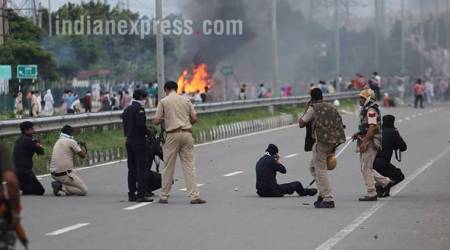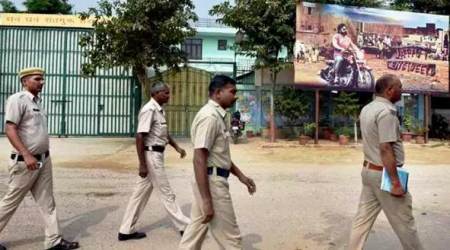 “This argument cannot be accepted any more in the context of a fundamental right to privacy than in the context of any other fundamental right,” said the court.
“This argument cannot be accepted any more in the context of a fundamental right to privacy than in the context of any other fundamental right,” said the court.
WHILE THE Centre said on Thursday that it welcomed the Supreme Court judgment and claimed it vindicated its stand, the nine-judge bench, in its order, pointed out several instances when the Centre and some state governments opposed the inclusion of right to privacy as a fundamental right during the hearing of the case.
Justice S A Bobde noted that Attorney General K K Venugopal had said during the hearing that “the right of privacy may at best be a common law right, but not a fundamental right guaranteed by the Constitution”.
“This submission is difficult to accept,” Justice Bobde wrote. “Privacy has the nature of being both a common law right as well as a fundamental right… Its content, in both forms, is identical,” he wrote.
The court noted that Venugopal had argued that “in a developing country, where millions of people are denied the basic necessities of life and do not even have shelter, food, clothing or jobs, no claim to a right to privacy as a fundamental right would lie”.
Responding to this, the court noted that “a large number of poor people that Shri Venugopal talks about are persons who, in today’s completely different and changed world, have cellphones, and would come forward to press the fundamental right of privacy, both against the government and against other private individuals.”
“We see no antipathy whatsoever between the rich and the poor in this context. It seems to us that this argument is made through the prism of the Aadhaar (Targeted Delivery of Financial and other Subsidies, Benefits and Services) Act, 2016,” the court noted.
The court said Additional Solicitor General Tushar Mehta had listed “innumerable statutes which protect the right of privacy wherever necessary and urged that it is neither necessary nor appropriate to recognise privacy as a fundamental right”.
“This argument cannot be accepted any more in the context of a fundamental right to privacy than in the context of any other fundamental right,” said the court.
The court noted that Venugopal had argued that the conclusions arrived at in the MP Sharma case (8-judge bench) and Kharak Singh case (6-judge bench) “should not be disturbed as they are supported by the fact that the founding fathers expressly rejected the right to privacy being made part of the fundamental rights chapter of the Constitution”.
“He referred in copious detail to the Constituent Assembly debates for this purpose,” said the court.
Detailing the debates of the Constituent Assembly, the court rejected the AG’s contention and said that the “Constituent Assembly was not a seminar on the right to privacy and its amplitude.” “A close scrutiny of the debates reveals that the Assembly only considered whether there should be an express provision guaranteeing the right of privacy in the limited context of ‘searches’ and ‘secrecy of correspondence’. Dimensions of the right of privacy are much larger and were not fully examined.”
“To sanctify an argument that whatever is not found in the text of the Constitution cannot become a part of the Constitution would be too primitive an understanding of the Constitution and contrary to settled canons of constitutional interpretation,” the court added.
“It cannot be concluded that the Constituent Assembly had expressly resolved to reject the notion of the right to privacy as an integral element of the liberty and freedoms guaranteed by the fundamental rights,” the court said.
The court also listed a series of objections raised by top law officers of the Centre and the BJP states during the hearing.
“He (Venugopal) also argued that the right to privacy cannot be claimed when most of the aspects which are sought to be protected by such right are already in the public domain and the information in question has already been parted with by citizens,” it added.
ASG Mehta, who appeared for the Unique Identification Authority Of India (UIDAI) and the State of Madhya Pradesh, “generally supported and adopted the arguments” of the Attorney General. Mehta, the SC said, argued that “privacy is an inherently vague and subjective concept and cannot, therefore, be accorded the status of a fundamental right”.
Aryama Sundaram, appearing for the State of Maharashtra, had supported the Attorney General’s arguments, and said that “there is no separate privacy right”. Sundaram “also referred to the Constituent Assembly debates to buttress the same proposition that the right to privacy was expressly discountenanced by the framers of the Constitution,” said the court.
A Sengupta, appearing on behalf of the State of Haryana, also supported Venugopal’s arguments and stated that “even the US Supreme Court no longer uses the right to privacy to test laws that were earlier tested on this ground”. Sengupta had said that “any right to privacy is conceptually unsound, and only comprehensive data protection legislation can effectively address concerns of data protection and privacy.”
Jugal Kishore, appearing for the State of Chhattisgarh, had also broadly supported Venugopal’s stand.
The court noted that Venugopal and Mehta, “in particular, argued that our statutes are replete with a recognition of the right to privacy… According to them, since these statutes already protect the privacy rights of individuals, it is unnecessary to read a fundamental right of privacy into Part III of the Constitution”.
The SC rejected these arguments.

